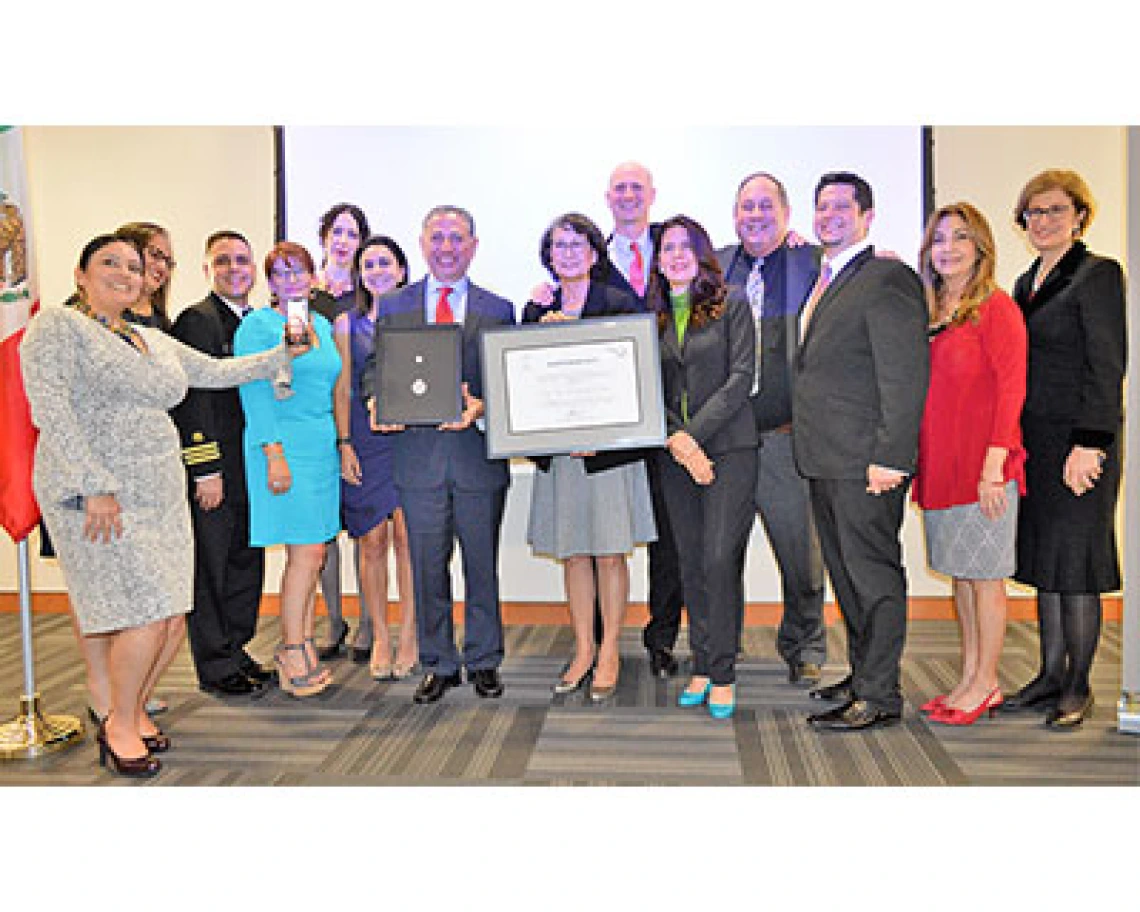UA’s Dr. Cecilia Rosales Honored for National Preventive Health Services Program
Cecilia Rosales, MD, MS, associate dean of Phoenix Programs at the University of Arizona Mel and Enid Zuckerman College of Public Health, and colleagues, accepted the Ohtli Award from the Mexican government in recognition of a national program to increase

Dr. Cecilia Rosales (center) and fellow advisory board members of the national Ventanillas de Salud program, receive the Ohtli Award at the Mexican Consulate in San Diego, Calif., in November. Photo: Ventanillas de Salud
Cecilia Rosales, MD, MS, associate dean of Phoenix Programs and professor of public health at the University of Arizona Mel and Enid Zuckerman College of Public Health, and members of the Advisory Board for the National Ventanillas de Salud (Health Windows) program, received the Ohtli Award from the Mexican Government for improving the quality of life for low-income and immigrant Mexican populations in the United States by improving access to basic preventive health services.
The highest recognition granted by the Mexican Government outside Mexico, the Ohtli Award is given to individuals and organizations who have aided, empowered or positively affected the lives of Mexican nationals in the United States and other countries. The ceremony was held at the Mexican Consulate in San Diego, Calif., in November.
Since 2016, the Ventanillas de Salud (VDS) Mobile Health Unit program has been providing free preventive health services to the uninsured and underinsured. Today, the program has 11 Mobile Health Units in Chicago, Dallas, Denver, Las Vegas, Los Angeles, Miami, New York, Orlando, Phoenix, Raleigh and Tucson.
Dr. Rosales is director of the Mobile Health Unit program in Maricopa and Pima counties, calling it an invaluable asset and a mechanism for reaching a large population of uninsured and underinsured individuals who are unaware and uninformed about available services.
“As a U.S.-Mexico border state and a border region with a high concentration of Latinos, it is Important to work toward increasing access to care, health information, health education and referral services, to build a culture of health and healthy communities,” Dr. Rosales said.
The nine members of the VDS Advisory Board are specialists and leaders in health care and migrant health, representing different government, academic, private and international organizations with expertise in public health to guide the implementation of the VDS program.
The members of the VDS Advisory Board are: Michael Flynn, program coordinator, National Institute for Occupational Safety and Health, Centers for Disease Control and Prevention; Francesca Gany, cancer researcher, Memorial Sloan Kettering Cancer Center; Larry Kline, critical care medicine specialist; Raul Lomeli, chairman of the board, SABEResPODER; Guillermo Avilés-Mendoza, international program coordinator, Office of Emergency Management, U.S. Department of Health & Human Services; Sylvia Partida, CEO, National Center for Farmworker Health, Inc.; Cecilia Rosales, associate dean of Phoenix Programs and professor, UA Mel and Enid Zuckerman College of Public Health; Ilan Shapiro, pediatric specialist; Rosa Villoch-Santiago, health systems manager, American Cancer Society.
About the University of Arizona Mel and Enid Zuckerman College of Public Health
Established in 2000, the Mel and Enid Zuckerman College of Public Health at the University of Arizona Health Sciences is the first nationally accredited college of public health in the Southwest. Today the college remains the only accredited college of public health in the state of Arizona with campuses in Tucson and Phoenix. The college enrolls more than 1,100 students per year across degree programs at the bachelor’s degree, master’s degree and doctoral levels. Through research, education and community engagement, the UA Zuckerman College of Public Health continues to find solutions to public health problems in Arizona, the Southwest and globally. For more information: publichealth.arizona.edu (Follow us: Facebook | Twitter)
About the University of Arizona Health Sciences
The University of Arizona Health Sciences is the statewide leader in biomedical research and health professions training. The UA Health Sciences includes the UA Colleges of Medicine (Phoenix and Tucson), Nursing, Pharmacy and Mel and Enid Zuckerman College of Public Health, with main campus locations in Tucson and the growing Phoenix Biomedical Campus in downtown Phoenix. From these vantage points, the UA Health Sciences reaches across the state of Arizona and the greater Southwest to provide cutting-edge health education, research, patient care and community outreach services. A major economic engine, the UA Health Sciences employs approximately 4,000 people, has approximately 800 faculty members and garners more than $140 million in research grants and contracts annually. For more information: uahs.arizona.edu (Follow us: Facebook | Twitter | YouTube | LinkedIn | Instagram)

